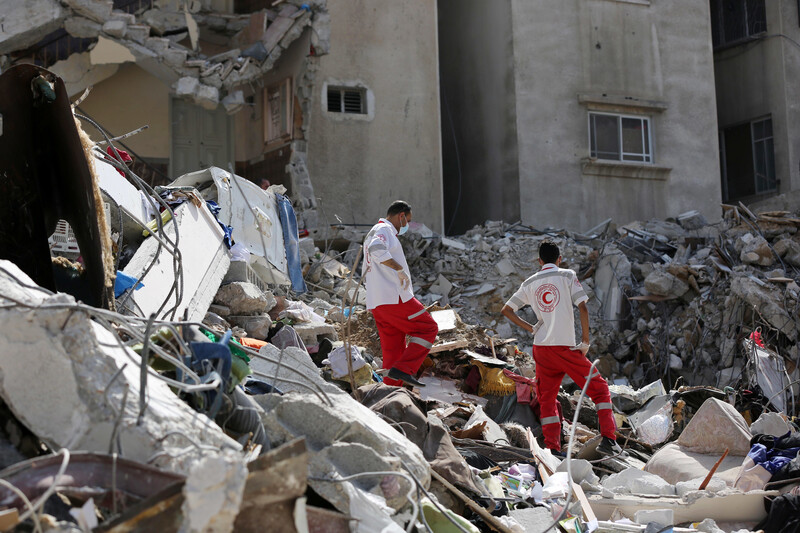When Israel killed doctors

Health workers came under attack when Israel bombed Gaza last month.
APA imagesIsra Saleh el-Namey - 4 June 2021
Dr. Ayman Abu al-Ouf had finished a busy shift.
He wrapped it up by checking on patients with COVID-19 in the intensive care unit of al-Shifa hospital.
As head of internal medicine at the hospital, he was acutely aware that the pandemic had not been paused. Rather, the number of coronavirus infections remained high even though Gaza was in the news internationally due to another emergency – a large-scale Israeli attack.
Not long after he got home from work, the building where Abu al-Ouf lived was bombed without warning.
He, his wife Reem and two of their children – Tawfiq and Tala – were killed. So were both his parents and many members of his extended family.
“Big shock”
Dr. Ghada Nasser was a colleague of Ayman Abu al-Ouf. She had accompanied him as he checked on patients that evening.
“He left the hospital to get some rest after a long day,” said Nasser. “It was a big shock to hear that he was then brought back to the hospital a few hours later – as a dead body. It has taken us a long time to absorb that terrible news.”
Abu al-Ouf was popular.
He had taught numerous medical students over the years. He was fond of organizing seminars to discuss advances in medicine.
Patients appreciated his dedication and diligence. “When I told him that I would buy the expensive medicine I needed, he would not hear of it,” said one woman, who had cancer and then a stroke.
“He did everything possible to ensure I could get the medicine free of charge,” the woman, who spoke on condition of anonymity, added. “He was a kind man.”
Abu al-Ouf was among two doctors killed during the early hours of 16 May – when Israel committed a massacre in the area surrounding Gaza City’s al-Wihda street.
The other was Dr. Muin al-Aloul, a neurologist.
Muin’s 25-year-old daughter Aya recalled that she had been terrified in the moments leading up to the massacre as Gaza had been under intense bombardment. She had gone into her parents’ bedroom to seek a little solace.
“Suddenly, I found myself covered with rubble,” she said. “The first thing I did was to shout out my parents’ names. My mom heard me and said ‘I am here.’ I asked her about my dad. She didn’t tell me that he was dead.”
“She didn’t want me to lose consciousness,” Aya added. “People came and dug me and my mom out of the rubble. As soon as I arrived at the hospital, I knew that my dad had been killed.”
Muin al-Aloul had run several clinics across Gaza.
“My father went to great lengths so that he could help people,” said Aya. “On many occasions, he asked patients to pray for him, rather than pay him. He was a doctor who people trusted a lot.”
Pattern of violations
More than 40 people were killed in the al-Wihda street massacre.
Israel’s bombardment left a large crater in a road leading to al-Shifa hospital, Gaza’s largest medical facility. Ambulances were impeded from traveling to and from the hospital as a consequence.
It was one of many incidents that had a direct impact on health services in Gaza during last month’s attack.
Among the facilities destroyed or damaged were Gaza’s only testing center for COVID-19, two Palestinian Red Crescent ambulance stations and a clinic caring for mothers and infants.
A new analysis by Al-Haq, a Palestinian human rights group, concludes that Israel’s attack “displays a pattern” of international law violations.
Al-Haq argues that the violations amount to war crimes. The Rome Statute under which the International Criminal Court was established forbids attacks against a civilian population and the destruction of civilian infrastructure.
Many of Gaza’s doctors have paid tribute to the two doctors killed during the massacre on al-Wihda street.
In one tribute, their colleagues walked from al-Shifa hospital to the site of the buildings which Israel bombed. A section of al-Shifa has been named in Ayman Abu al-Ouf’s memory.
“We have just done our little bit to remember the two doctors,” said Dr. Mohammed Abu Selmia, al-Shifa’s director. “We believe that the best thing we can do for them is to follow the examples they set. That means taking good care of patients.”
Isra Saleh el-Namey is a journalist from Gaza


No comments:
Post a Comment
Note: only a member of this blog may post a comment.